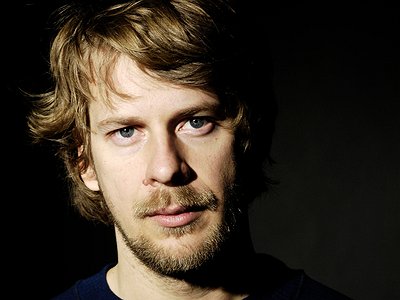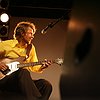Part 2
Purportedly, John Stevens of the Spontaneous Music Ensemble had two basic rules to playing in his ensemble: (1) If you can't hear another musician, you're playing too loud, and (2) if the music you're producing doesn't regularly relate to what you're hearing others create, why be in the group. What's your perspective on this statement and how, more generally, does playing in a group compare to a solo situation?
Good points but if you need to say those rules aloud you already have wrong people in the group. How to improvise freely in a group is a mystery to me. Improvising collectively is a chaotic process that can be great fun to the players, sometimes also to the listeners. The freer it is and the bigger the group is, the more difficult it gets.
The more you need to talk about the rules in improvisation among the musicians, the worse the music probably is. It is at best very intuitive, like fish school moving together. A question of similar aesthetic taste with your fellows becomes a deep issue. Also how you feel form and time together with the fellow musicians is of great importance. Sometimes too much democracy in music leads into chaos or boredom but at its best collectively improvised music is incredibly deep and like nothing that could be composed by a single individual.
Playing solo is simpler in a way but if the music is improvised the problem can be a lack of ideas and input - it can become a bit like masturbation. It is very demanding on a long run because there is never a moment when some one else takes over. I have a solo project where I play the guitar over electronics in 5 different amps that are placed around the audience. Part of the program is composed and part of it is improvised. The challenge is often how the improvised and composed parts flow together. Musically the project is great fun and a good challenge but I haven´t been so into touring with the project lately, it is too lonesome.
With more and more musicians creating than ever and more, what does this mean for you as an artist in terms of originality? What are some of the areas where you currently see the greatest potential for originality and who are some of the artists and communities that you find inspiring in this regard?
There are endless possibilities to organize sound and it is fun to explore some of these spaces. But there are not endless amounts of people that have interest in listening all these possibilities. A lot of interesting music has been already made and some choices are not possible because of that. Originality that reaches some audience is hard enough but that was probably always so.
Being a professional musician that has a family and no other job means a certain responsibility also to earn something with the music. That can have a negative and a positive effect to the music being made. If a musician starts making aesthetic decisions based on the possibilities to sell the music, the music probably suffers in certain ways. Still there is nothing bad having a big audience if the music feels honest.
There is a great amount of interesting music being done here in Berlin by musicians who operate between improvised and composed music like the drummer Tony Buck (the Necks), the pianist Achim Kaufmann or the composer Michael Wertmüller for example.
What constitutes a good live performance in your opinion and what’s your approach to performing on stage? How do an improvisation and the recording of this improvisation compare?
I myself enjoy having a feeling that the performer is communicating with the listeners although he doesn’t have to make a fuzz about it. As improvisation often is a process which has its searching moments it is more interesting being experienced live.
Listening is also an active, rather than just a passive process. How do you see the role of the listener in the musical communication process?
If there is no listener, music is like practising. When a musician is playing music for someone, the decisions made in time cannot be taken back. Each moment of the performance becomes unique and not repeatable. The listener gives the musical universe its dimensions.
How do you see the relationship between music and other forms of art – painting, video art and cinema most importantly - and in how far, do you feel, does music relate to other senses than hearing alone?
To me the connection between visual and audio worlds is fascinating. I have done four albums with cinematic themes. In the concerts there were no visuals, the film themes served as a point of association and a possible lift off for inner pictures of the listener. With the group K-18 (which is a short form of films prohibited under 18 years in Finnish) we made tribute albums to Stanley Kubrick (Some Kubricks of Blood, Tum Records 2009), David Lynch (Out to Lynch, 2012) and Luis Bunuel (Bunuel de Jour, 2014). These albums were based on certain aspects of the directors´ work as an inspiration to the music. For example on Some Kubricks of Blood the compositions were inspired by the spaces and rooms in Kubricks films and on Out to Lynch the characters of David Lynch´s films served as an inspiration. This gave me quite a bit of space and freedom, on the other hand the compositions got a certain flare which hadn´t happened without these pictures in my head. The fourth cinematic work is Finn Noir by Klima Kalima where Finnish Film Noir served as an inspiration. We have worked with Vjs a few times and that can be great but is not easy to find the balance of how much information is enough.
Still I think most music doesn´t necessary need any pictures to it and it is usually most interesting to let the listener create his own visions.
Reaching audiences usually involves reaching out to the press and possibly working with a PR company. What's your perspective on the promo system? In which way do music journalism and PR companies change the way music is perceived by the public?
The music I do is situated somehow between jazz, rock and experimental music. It isn´t always so easy to communicate what that is to the audience. Music journalism has an important role there and I have been usually treated kindly by the journalists. I guess it is important to define each music clearly and by clear stylistic definitions journalism sometimes can have an undesirable effect. If the music is called jazz or free jazz not many people will want to hear it. If that same music is called experimental rock it might have better chances although for certain audience that is no go. It is hard or impossible to define music thoroughly by any words. I wish sometimes that it was possible just to go out an play and reach any people that happen to hear the music.
Do you have a musical vision that you haven't been able to realise for technical or financial reasons – or an idea of what music itself could be beyond its current form?
Some huge black holes in centers of large galaxies send out deepest tones in the universe. A black hole in Perseus cluster is playing a Bb 57 octaves below our normal range. It would be great to play an intergalactic concert using that black hole as an instrument. The concert would be long, the scientists think that that tone has existed there for 2,5 Billions of years. That band would literally have the deepest bass lines of the universe and the longest songs. Here a link.
Find out more about Kalle Kalima on his personal website.






